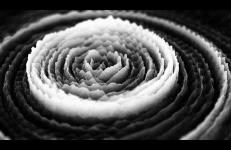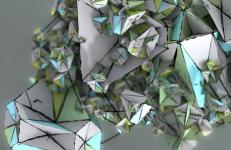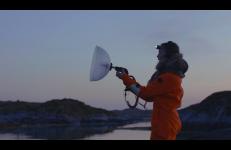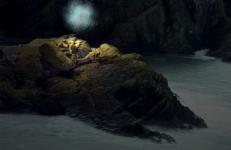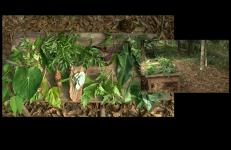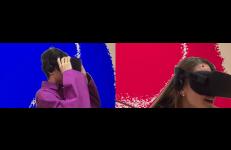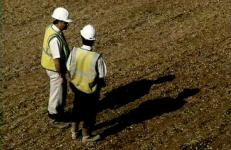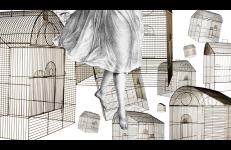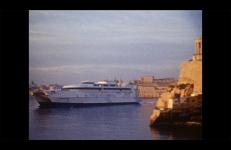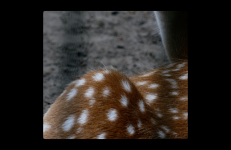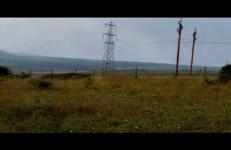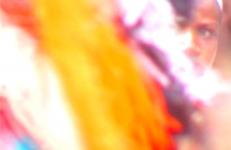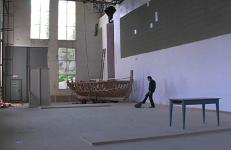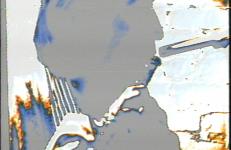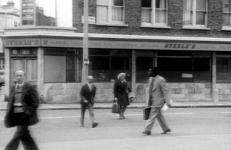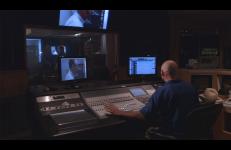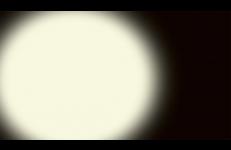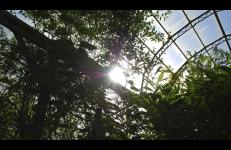20 Hz observes a geo-magnetic storm occurring in the Earth's upper atmosphere. Working with data collected from the CARISMA radio array and interpreted as audio, we hear tweeting and rumbles caused by incoming solar wind, captured at the frequency of 20 Hertz. Generated directly by the sound, tangible and sculptural forms emerge suggestive of scientific visualisations. As different frequencies interact both visually and aurally, complex patterns emerge to create interference phenomena that probe the limits of our perception.
Sound
For 200 Nanowebbers, Semiconductor have created a molecular web that is generated by Double Adaptor's live soundtrack. Using custom-made scripting, the melodies and rhythms spawn a nano scale environment that shifts and contorts to the audios resonances. Layers of energetic hand drawn animations, play over the simplest of vector shapes that form atomic scale associations. As the landscape flickers into existence by the light of trapped electron particles, substructures begin to take shape and resemble crystalline substances.
3 Church Walk is a film made with writer Jonathan P. Watts and sound composer Simon Limbrick about the empty and neglected Suffolk house of modernist architect H. T. ‘Jim’ Cadbury-Brown.
Located on the Lofoten Islands in Northern Norway, Acoustic Ocean sets out to explore the sonic ecology of marine life. The scientist as an explorer and important mediator of the contemporary understanding of our planetary ecosystems is a central figure in this video. She makes her appearance in the person of a Sami (indigenous of northern Scandinavia) biologist-diver who is using all sorts of hydrophones, parabolic mics and recording devices. Her task is to sense the submarine space for acoustic and other biological forms of expression.
Presented as a fictional documentary, the sound film All the Time in The World sees the millions of years that have shaped and formed the land, played out at the speed of sound.
Semiconductor have reanimated Northumbria's epic landscape using data recordings from the archives at the British Geological Survey in Edinburgh. This data of local and distant seismic disturbances has been converted to sound and used to reveal and bring to life the constantly shifting geography around us.
Aura of IEVE, edited by Phil Morton, is video documentation of the first Interactive Electronic Visualization Event (IEVE) at the University of Illinois Circle Campus. Unlike IEVE Aura, which features the image processed and audio synthesized video from the event, the camera instead focuses on the artists creating the video: Tom DeFanti on the Digital Keyboard (computer), Dan Sandin on the Image Processor, and Bob Snyder on the sound keyboard.
As an ominous voice guides us through Best Is Man’s Breath Quality, we are confronted by dense and complex images and sounds that appear and disappear before us. From primates engaging with their reflected selves to glowing jellyfish drifting through deep and dark oceans, our visual perception of the human figure is decentered, leaving only the grain of analog and digital voices recognizable to our senses.
As an ominous voice guides us through Best Is Man’s Breath Quality, we are confronted by dense and complex images and sounds that appear and disappear before us. From primates engaging with their reflected selves to glowing jellyfish drifting through deep and dark oceans, our visual perception of the human figure is decentered, leaving only the grain of analog and digital voices recognizable to our senses.
"Blight was made in collaboration with composer Jocelyn Pook. It revolves around the building of the M11 Link Road in East London, which provoked a long and bitter campaign by local residents to protect their homes from demolition. Until 1994, when our houses were destroyed, both the composer and I lived on the route of this road. The images in the film are a selective record of some of the changes which occurred in the area over a two-year period, from the demolition of houses through to the start of motorway building work.
This is a tape which analyzes its own discourse and processes as it is being formulated. The language of Boomerang, and the relation between the description and what is being described, is not arbitrary. Language and image are being formed and revealed as they are organized.
This title is only available on Surveying the First Decade: Volume 1.
If asked to say what this work is about in one word, the answer — which is woven into the electronic musique concrète soundtrack — would be a Joycean one: it’s a “collideorscape.” The imagery is a return to materials Rankus dealt with as a young man in the video Naked Doom (1983). He has recycled imagery such as cages, a toy robot, and brain convolutions; newer motifs include a winged ballerina, Victorian corsets, and alchemical vessels containing birds.
CURRENCY is a sound-film of refusal—a woman wears bygone forms of currency on the tips of her hair while preserving the greatest currency for herself. CURRENCY explores the archive of embodiment through gesture and sonic transmissions, with sounds generated from articulations of the body itself.
A hypnosis-inducing pan-geographic shuttle built on brainwave-generating binaural beats, Deep Sleep takes us on a journey through the sound waves of Gaza to travel between different sights of modern ruin. Restricted from travel to Palestine, I learned auto-hypnosis for the purpose of bi-locating. What results is a journey, recorded on Super 8mm film, to the ruins of ancient civilizations embedded in modern civilization in ruins, to a site ruined beyond evidence of civilization.
An unexpected ASMR respiratory exam. ASMR is a popular genre of videos on youtube, lead by soothing sounds believed by its creators to generate euphoria, a sound porn of sorts.
DOTS is a part of Ann Oren’s video journals, a short video series responding to social media culture in a square format, often starring animals.
Doubling Forbidden Planet is a feature length reedit of the 1956 science fiction film Forbidden Planet. This re-edit was produced in 2003 using a DIY apparatus of sequenced analog security system switchers, circuits and VHS players captured into a computer. The semi rhythmic and overlapping cuts produced by the switchers generated fragmented movement, dialogue, and soundtrack. Forbidden Planet’s soundtrack was made by Bebe and Louise Baron.
Earthmoves is a continuation of Semiconductor's exploration into how unseen forces affect the fabric of our world. The limits of human perception are exposed, revealing a world which is unstable and in a constant state of animation as the forces of acoustic waves come into play on our surroundings.
A short Flicker Film adulterated by some extra images shot in Malawi, Africa. FF was in answer to an assignment given by artists Melissa Dubbin and Aaron Davidson who created the soundtrack to which I was asked to make a “Future Film”.
-- Deborah Stratman
The combination of a found site (an old power station in Norway), and a found object (a log) and a found instrument ( a wooden floor) produce a found sound in this acoustically alive action.
This title is also available on Sympathetic Vibrations: The Videoworks of Paul Kos.
Relying on the magic echo found in an old power Station in Norway, the artist whistles and marches to the Internationale, a May Day workers’ song.
This title is also available on Sympathetic Vibrations: The Videoworks of Paul Kos.
"Newly hand-built digital video A to D and D to A with ALU bit flipping. Controlled by an ELF II computer. The image brightness changes also controlled analog synthesizer parameters of the live flute playing. I sat in the camera image zone and played along with the programmed staccato picture and sound shifts. David Jones, digital video design."
– Peer Bode
“In The Girl Chewing Gum a commanding voiceover appears to direct the action in a busy London street. As the instructions become more absurd and fantasized, we realize that the supposed director (not the shot) is fictional; he only describes—not prescribes—the events that take place before him. Smith embraced the ‘spectre of narrative’ (suppressed by structural film) to play word against picture and chance against order.
A single-shot, choreographed portrait of the Foley* process, revealing multiple layers of fabrication and imposition. The circular camera path moves inside and back out of a Foley stage in Burbank, California. While portraying sound artists at work, typically invisible support mechanisms of filmmaking are exposed, as are, by extension and quotation, governmental violations of individual privacy.
The video hovers tentatively between therapy, documentary, poetics and mystic traipsery and ends, like all good things, in surrender to song. There is a challenge presented (the challenge to engage earnestly with the piece as it requests) to fall into the breathing and pacing presented, and the challenge to view the video as a discrete piece of art at the same time. The piece relies heavily on the text, the disembodied Virgil through which the words become musical, instructive and (due to the absence of image) visual.
Heliocentric uses timelapse photography and astronomical tracking to plot the sun's trajectory across a series of landscapes. The entire environment seems to pan past the camera whilst the sun stays in the center of each frame, enabling us to gauge the earth's rotation and orbit around the sun. As the sun's light becomes disrupted by passing weather conditions and the environment through which we encounter it, it audibly plays them as if it were a stylus.
Immaterial Terrain is a film made by Emily Richardson along a seven-mile stretch of the UK coast between Sizewell nuclear power station and the mythic drowned city of Dunwich. Camera in hand, over the duration of a year Richardson repeatedly walked this coastline. These walks – pilgrimages and acts of protest – structure a film that documents a singular and fragile landscape at an uncertain moment. Plans to expand the nuclear power station at Sizewell will have a lasting impact on the environment.




